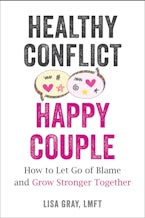By Lisa Gray, LMFT, author of Healthy Conflict, Happy Couple
You’ve decided to attend couples counseling, but where should you start and how do you get the most out of it? If you’ve never been to couples counseling before, you may feel intimidated by the process.
Start by finding the right fit. It is well known that the best possibility for success lies in the fit between you and your therapist. My suggestion is to screen therapists initially by asking what kind of training they have in couples’ theory—it’s okay if you don’t understand their answer; they should just have an answer. I also like to know what percentage of their caseload is couples, and it’s good to aim for a therapist who has at least 50 percent couples in their practice. Conducting couples therapy is a completely different skill than individual therapy, so you want someone who has some experience in this area. Even then, you’ll have to gauge how you feel when sitting with the therapist. Are you comfortable? Do you feel like they hear and respect both of you?
Know your goals going in. You can’t hit a target you’re not aiming at, so if you want to make progress, it’s good to clarify what exactly you are trying to accomplish with the work. If you have a hard time doing this, ask the therapist directly to help you come up with achievable goals. Often, two partners have different expectations and wishes concerning the outcome. It’s helpful to be on the same page and to try to develop a road map of how to get to the destination.
Do the work. Even the best couples therapist in the world can’t help you if you are only working on your relationship one hour a week. Outside of the therapy room, you’ll need to be putting into practice everything you are learning, and intentionally trying to change patterns.
Expect discomfort. If you’ve been in individual therapy, you know that it feels great to have an advocate, someone who is 100 percent on your side with unconditional regard. Couples counseling is an entirely different experience. Hopefully your therapist will be very balanced in challenging each of you on your contribution to the problem, but you will be challenged. If you are going to change an unhelpful dynamic, you will need to see your part in the problem, and be willing to hear suggestions about how you can do things differently. Expect to leave the office at times feeling discouraged and even hopeless. This is part of the process and entirely normal.
Collaborate with the therapist. Your therapist is the expert on healthy relationships, but you are the expert on you. Not every intervention or direction the therapist might take will work for you. We, as therapists, really love when you let us know that something we’re doing isn’t working for you. In this way, we can customize the treatment specifically to you and your situation. You are the consumer, and need to speak up to make sure that the services you are receiving are working for you. Therapists are not always right; we make mistakes. We are happy to have your feedback and collaboration so that we can adjust the course as we go.
Don’t be afraid to switch therapists. We all have a different style, and our greatest wish is that you are set up with a therapist who fits you. So, if after collaborating with your current therapist, you still feel like the therapy isn’t working for you, a switch may be in order. Start by talking to your therapist! I know it seems counterintuitive, but if you tell your therapist specifically what isn’t working for you, they may be able to suggest another therapist whose style fits what you are looking for. For example, some therapists are warm and nondirective; other therapists are very active and challenging. Some therapists stick to practical nuts-and-bolts aspects of your relationship; some therapists delve deep into the emotional realm. It’s quite an investment in time and money to do this work, so don’t be afraid to advocate for yourself if you think a different style would serve you better.
Improving your relationship is a brave undertaking, and takes some work. You’ll be learning new skills, new ways of interacting and deepening your connection. Try to look at it as an adventure and mastery of new skills. Great relationships usually don’t happen by accident, so you are joining those committed to creating healthy and loving relationships.
Lisa Gray, LMFT, is a licensed mental health professional with a private practice in the San Francisco Bay Area, where she specializes in high-conflict couples and chronic illness/pain. After working as an air traffic controller for ten years, and serving as a peer debriefing counselor for fellow controllers, Lisa decided to go back to school to study counseling. She graduated from John F. Kennedy University in 2004 with a master’s degree in clinical counseling, and has been working in the field ever since. Lisa is passionate about teaching couples to practice healthy conflict, so that their relationships can thrive and grow. Lisa reviews self-help books on her Instagram, Therapy Book Nook. She lives in the Bay Area with her family and three large dogs.



 Part 2: What to Do When a Client Is Participating in Self-Judgment?
Part 2: What to Do When a Client Is Participating in Self-Judgment?